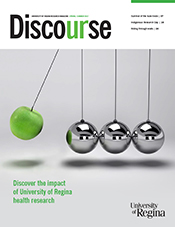SSHRC’s Insight Research program funds seven U of R projects.

University of Regina researchers recently received close to $1 million in funding through the federal government’s Social Sciences and Humanities Research Council (SSHRC) Insight Research program. Rather than focusing on scientific discovery, this funding supports research that furthers our understanding of people and cultures, our histories and societies, and how we understand the world.
Dr. Taiwo Afolabi, University of Regina Canada Research Chair in Socially Engaged Theatre, received a $73,899 Insight Development Grant for his project Policing Saskatchewan: BIPOC Youths Speak Out.

Statistics Canada has revealed that Black and Indigenous populations in Canada are twice as likely to mistrust the police.
Afolabi says this is because youth who are Black, Indigenous, and people of colour (BIPOC) frequently experience police brutality, racial profiling, and other forms of discrimination.
“This is particularly evident in regions like the Canadian Prairies, notably Saskatchewan, where historical issues with policing, such as the infamous Starlight Tours and the mishandling of missing and murdered Indigenous women cases, have left deep scars,” says Afolabi.
For his project, Afolabi’s team will gather BIPOC youth perceptions of policing in Saskatchewan.
“My team and I will use storytelling to amplify their voices with the goal to foster healing and equity,” says Afolabi.
Another Insight Development Grant recipient is historian Dr. Maris Rowe-McCulloch, who received $34,785 for her project, Experiencing Atrocity: Soviet Prisoners of War in German Captivity during World War II.

Nearly six million Soviet prisoners of war (POWs) were captured by the German army during World War II, with 3.3 million dying from starvation, disease, or by execution.
“These stories remain largely untold because of the dire conditions the prisoners faced in captivity, which made writing letters or diaries almost impossible, as well as post-war government suspicion that discouraged survivors from speaking out,” says Rowe-McCulloch.
Rowe-McCulloch aims to publish a book on the experiences of Soviet POWs in the German-occupied USSR.
“I’ll use materials from a relatively untapped archival collection created by a Soviet wartime investigative body, the Soviet Extraordinary State Commission,” says Rowe-McCulloch. “These records include interviews, forensic reports, and artwork that document the mistreatment of Soviet POWs, offering a rare glimpse into their tragic experiences.”
Dr. Christopher Yost, Vice-President (Research) at the University says the breadth of research being supported through the SSHRC Insight Research program highlights the impact of University of Regina research. "Our scholars are engaged in diverse and critical projects that are advancing knowledge and deepening our understanding of society and our role within it."
Several other University of Regina scholars also received funding.
SSHRC’s Insight Grants support both emerging and established scholars. Congratulations to this year’s University of Regina Insight Grants recipients:
Dr. Amanda Hancock, assistant professor of leadership in the Faculty of Business Administration, received $217,622 for her project on leader presenteeism, exploring how managers balance their health with organizational needs and its effects on team performance.
Dr. JoAnn Jaffe, professor emerita in sociology, received $294,440 for her project Gone Today, Here Tomorrow: Moving from Vulnerability and Inequality to Active Citizenship via Public Transportation, which examines how access to public transportation impacts social inequality and vulnerability in rural communities.
Dr. Charity Marsh, professor of creative technologies, was awarded $282,665 for her study on feminist activism through Girls Rock Camps in Canada, analyzing their role in supporting girls, women, non-binary, and gender-expansive children, youth, and adults, as well as shaping local music scenes across the country.
SSHRC's Insight Development Grants support early-stage research, fostering new questions, methods, and ideas. Along with Dr. Taiwo Afolabi and Dr. Maris Rowe-McCulloch, this year’s University of Regina recipients also include:
Dr. Andrew Eaton, associate professor of social work, received $75,000 for Alternative Crisis Mental Health Response Models, which examines non-police crisis teams to recommend best practices for transformative justice.
Dr. Brittany Tomin, assistant professor in education, received $69,386 for Imagination and Speculative World Building, exploring how speculative fiction can be used in early childhood education to engage children in thinking about climate futures.

















